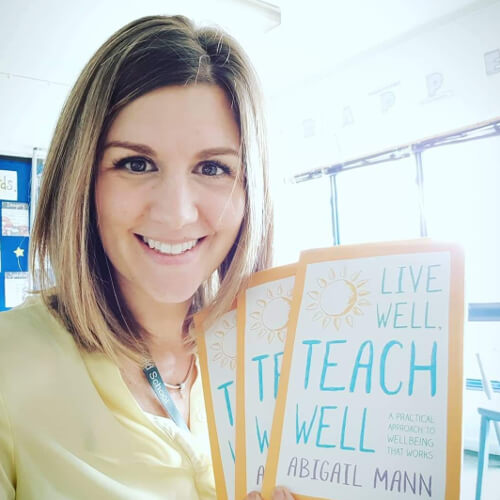6 Ways for Primary Teachers to Work Smarter and Save Time

Constantly running out of hours in the day to complete your to-do list? Make a change with Abigail Mann’s savvy ideas…

- by Abigail Mann
- Deputy headteacher and author of Live Well, Teach Well

4 | The 80/20 rule
The 80/20 rule was invented by economist Vilfredo Pareto over 100 years ago. The rule is that 80% of any given effects come from 20% of the causes. Put into educational terms, 80% of achievement results come from 20% of the work we do with our pupils. Write a list of all the things you could stop doing tomorrow, knowing that nothing would change as a result. For example, stop making bling-style, beautiful PowerPoints. Sure, they look nice, but what impact are they having on the long-term goal? Pupils will learn, whether you have an animated slide or not.
5 | Review and reflect
Create a folder on your computer and fill it with really successful lessons. Simply drop them in at the end of the day or week. When you are really struggling for time or just can’t think of an idea for a lesson, return to your folder and use something you know works well. Better still, have a shared folder that your teaching buddies can contribute to as well.
6 | Drop lesson objectives
I stopped writing lesson objectives on the board over two years ago. The reason? They are a total waste of time. What does it matter if the pupils don’t have them written in their books or they aren’t on the board? If you want pupils to know what they’re doing that lesson, just tell them. One way that you could introduce lessons to pupils is by presenting them with ‘the big question’. This remains the same throughout the scheme of work and each week, or lesson, the skill focus changes. As the weeks go on, children will begin to understand why each skill is so important to the bigger picture – no tedious lesson objectives needed to understand that.
Abigail Mann has been teaching for six years. This is an extract from her book Live Well, Teach Well (£16.99, Bloomsbury). Follow her on Twitter at @abbiemann1982.
1 | Email efficiency
What’s the first thing you do when you arrive to work in the morning? Log on to the school system and, no doubt, check your emails. This can be disastrous for the day ahead as you are likely to get distracted by messages that arrived in your inbox overnight. The solution to this? Simple. Check your emails after you have set yourself up for the day. Not only does this save time in the morning, it also reduces the amount of pressure placed on you at the start of each day.
2 | Effective to-do lists
Lists help me to organise my thoughts and I feel a huge sense of satisfaction when I get through the tasks I’ve listed as important. On the flip side of this, however, I can often feel tortured if I don’t complete everything on the list. Try writing yours the night before. With a plan already in place, you can get started straight away when you arrive at work the next day. Keep your list short: there’s no point writing one as long as your arm if you know the likelihood is you won’t complete everything. This will result in you feeling like you haven’t been productive and stress will begin to seep in. Create a short list of five or fewer tasks, thinking about which are the most important.
3 | Know your time
It makes sense to figure out what time of the day you are most productive and plan accordingly. If you know you are more productive in the morning, rise an hour earlier and get some work done before the school day starts. If you are a night owl, make some time each evening to plan. Just make sure you get the extra sleep you need in the morning to be able to get through the day.
4 | The 80/20 rule
The 80/20 rule was invented by economist Vilfredo Pareto over 100 years ago. The rule is that 80% of any given effects come from 20% of the causes. Put into educational terms, 80% of achievement results come from 20% of the work we do with our pupils. Write a list of all the things you could stop doing tomorrow, knowing that nothing would change as a result. For example, stop making bling-style, beautiful PowerPoints. Sure, they look nice, but what impact are they having on the long-term goal? Pupils will learn, whether you have an animated slide or not.
5 | Review and reflect
Create a folder on your computer and fill it with really successful lessons. Simply drop them in at the end of the day or week. When you are really struggling for time or just can’t think of an idea for a lesson, return to your folder and use something you know works well. Better still, have a shared folder that your teaching buddies can contribute to as well.
6 | Drop lesson objectives
I stopped writing lesson objectives on the board over two years ago. The reason? They are a total waste of time. What does it matter if the pupils don’t have them written in their books or they aren’t on the board? If you want pupils to know what they’re doing that lesson, just tell them. One way that you could introduce lessons to pupils is by presenting them with ‘the big question’. This remains the same throughout the scheme of work and each week, or lesson, the skill focus changes. As the weeks go on, children will begin to understand why each skill is so important to the bigger picture – no tedious lesson objectives needed to understand that.
Abigail Mann has been teaching for six years. This is an extract from her book Live Well, Teach Well (£16.99, Bloomsbury). Follow her on Twitter at @abbiemann1982.










